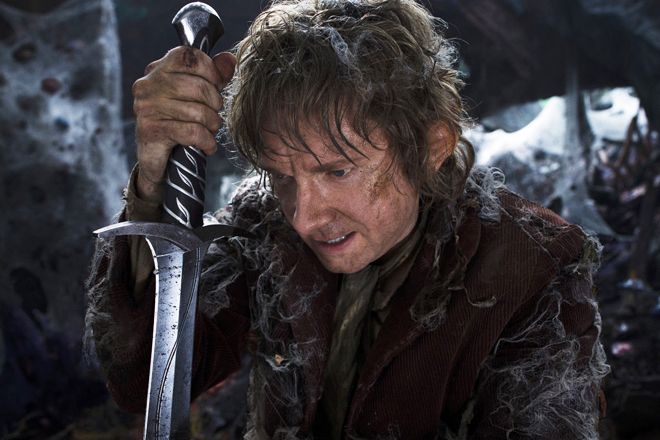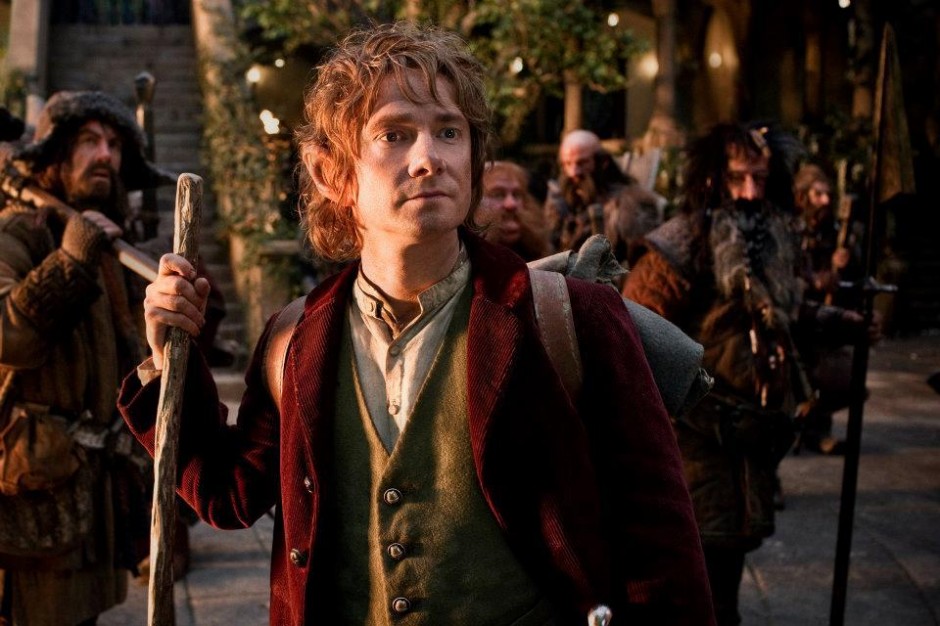26 December 2012
Directed by: Peter Jackson
Starring: Martin Freeman, Ian McKellen, Richard Armitage and Ken Stott
What It’s About: A young Bilbo Baggins treks on an adventure to reclaim a dwarven kingdom from the clutches of the powerful dragon Smaug.
Rated PG-13 (for extended sequences of intense fantasy action violence, and frightening images)
Runtime: 169 minutes
By Cole Nelson, Staff Writer
“In a hole in the ground there lived a hobbit,” and from that hobbit, with the addition of an immensely large cast and crew and the always-impressive work of director Peter Jackson, there came the much-anticipated The Hobbit: An Unexpected Journey.
Taking place 60 years before the events of the popular Lord of the Rings trilogy, The Hobbit reintroduces a younger Gandalf the Grey (Ian McKellen), Bilbo Baggins (Martin Freeman) and Gollum (Andy Serkis), whose age no longer plays a factor in his appearance. A reluctant Bilbo is asked by the well-known wizard Gandalf to accompany him and 13 peculiar dwarves, who later appear at Bilbo’s quarters one by one, on an adventure. Provided with a back story on the dwarves, Bilbo learns that the team, led by Thorin Oakenshield (Richard Armitage), will travel to the far away Lonely Mountain in hopes of slaying the dragon Smaug who besieged their land and stole their riches. With a bit of pondering and an inexplicable lust for traveling, Bilbo joins Gandalf and the dwarves in their bold quest, in which they encounter hazardous hindrances (orcs, goblins, trolls, etc.) along the way.
The Hobbit could not arrive soon enough. Fans, including myself, have waited over a year for this groundbreaking blockbuster and, speaking for the masses, they were not disappointed.
Part one of a three part series, The Hobbit is an adaptation of J.R.R. Tolkien’s admired novel of the same title, basing its storyline off the novel’s first six chapters. Unlike several other book-to-film adaptations, The Hobbit does a phenomenal job staying true to the original story, even quoting direct lines of dialogue from the novel. Compared to Jackson’s earlier Middle Earth movie trilogy, An Unexpected Journey differs greatly (as do the novels). Tolkien’s The Hobbit is more lighthearted and childish in its style, which Jackson successfully mimics in his film by incorporating exceptionally colorful scenery and several necessary chuckles. Bilbo’s story is much less enduring and more emotionally detached than Frodo’s, allowing Jackson to include this sense of vivacity in his new film.
 With great performances, serene backdrops, classic camerawork and a touch of comedic relief, there was only one thing The Hobbit lacked: major flaws, albeit with the exception of its overuse of CGI and extended length. Several fans, and critics for that matter, declared the film’s running time of two hours and forty-six minutes to be too long, that it shouldn’t take half an hour for the group to even kick start their adventure. However, when going into a Peter Jackson picture—the man behind Lord of the Rings and King Kong—one should only expect a film that lasts the majority of an afternoon.
With great performances, serene backdrops, classic camerawork and a touch of comedic relief, there was only one thing The Hobbit lacked: major flaws, albeit with the exception of its overuse of CGI and extended length. Several fans, and critics for that matter, declared the film’s running time of two hours and forty-six minutes to be too long, that it shouldn’t take half an hour for the group to even kick start their adventure. However, when going into a Peter Jackson picture—the man behind Lord of the Rings and King Kong—one should only expect a film that lasts the majority of an afternoon.
Regarding the CGI, the postproduction crew used it well, almost too well, but also too much. Granted, I don’t know how else one would film a group of dwarves scurrying about underground on a two-foot thick wood-plank bridge with thousands of goblins chasing them. But a shot where the only real objects on screen are the actors, to me, is a bit overwhelming. On the other hand, this CGI, used in its simplest form, gave the film some of the most stunning and picturesque backdrops I have ever seen (the Elven outpost Rivendell has never looked so attractive). In this context, CGI is a double-bladed Elfish sword that is used effectively, if abundantly.
Although Andy Serkis, as Gollum, only made a short, one-time appearance in An Unexpected Journey, it was arguably the greatest bipolar de-hobbitized moment in all of Jackson’s films. Bilbo encounters Gollum in his rotten underground habitat where they have a battle of wit in the form of riddles. Serkis’ return to the grimy creature was spectacularly revolting. Therefore, he successfully did his job in portraying the depraved thing. Similar to the LOTR films, Gollum was again created through motion capture, a system that tracks Serkis’ movements and turns them into the animated varmint. Because technology has advanced since his last appearance, Gollum now has beautiful facial emotion and entrancing blue eyes.
As a fan of the Lord of the Rings trilogy, I did find minor downsides to the film, such as the new look to the goblins and orcs, although these don’t detract from the movie as a whole.
The Hobbit, as expected, does have a fittingly epic score and, of course, a splendid, chill-inducing original song sung by the thirteen dwarves.
The film is a must-see and will most likely follow in the footsteps of Lord of the Rings by winning several Academy Awards.
9/10
Courtesy of www.beyondhollywood.com and media.salon.com

